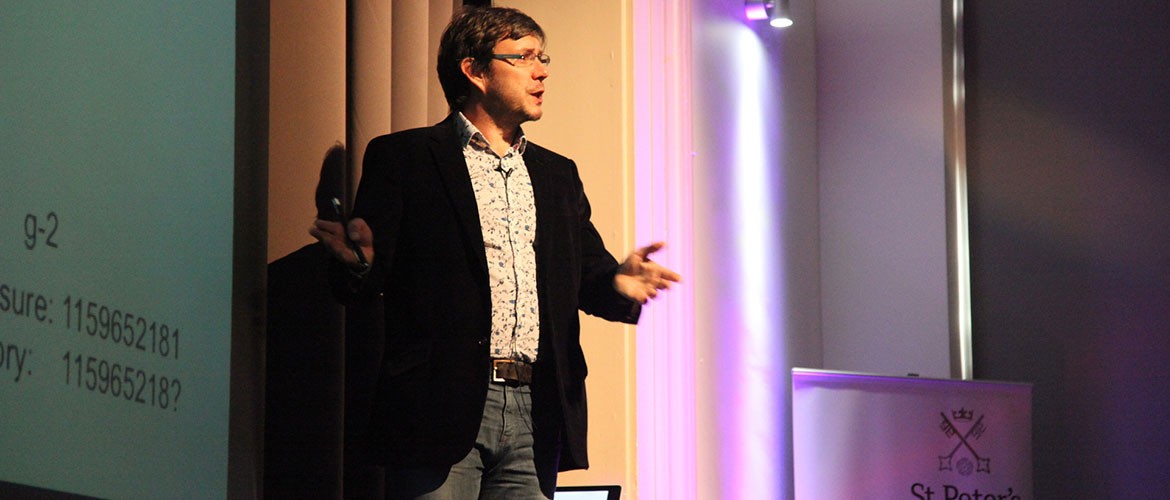Professor Jeff Forshaw, The Quantum Universe, York Festival Of Ideas
St Peter’s School, York
Tue Jun 9
Trying to understand quantum mechanics can leave you feeling as though your brain has been turned inside out, and pulled out through your ears. It’s not an easy subject, but it is an essential one when trying to understand how the universe works.
Professor Jeff Forshaw of the University of Manchester held a packed auditorium enthralled while he introduced us to the very basics of the bizarre and counter-intuitive world of quantum mechanics.
It’s a thankless task, trying to explain something that is so difficult to grasp – even more so when you are talking to people who don’t necessarily have a scientific background. But Professor Forshaw succeeded, with infectious enthusiasm, clarity and wit.
Little wonder that the Institute of Physics has awarded him the Kelvin Medal, for his communication of scientific ideas to non-scientists.
To quote the professor again: “Everything that can happen, does happen.”
Everyone remembers that Sir Isaac Newton suddenly understood gravity when he was hit on the head by an apple. The story may not be strictly accurate but, because of this discovery, he was able to come up with laws to explain how everything moves and works – laws that have never been disproved.
What scientists like Einstein began to realise, a century or so ago, is that Newton’s laws only work on big, slow things. Planets. People. Dust.
They don’t work on the tiniest and fastest of particles – the kind of things you find within an atom. To understand how these move and interact, we need a different set of laws. And that, in a very basic nutshell, is quantum mechanics.
In Professor Forshaw’s words, “It makes you look at the world in a different way forever after.”
Suddenly you realise that we share the universe with tiny subatomic particles – electrons, photons, quarks, the elusive and famous Higgs boson – which can move from the point where they are at one moment, to any other point in the galaxy at the next moment, an infinite possibility of destinations.
To quote the professor again: “Everything that can happen, does happen.”
Death and dark matter

In his hour-long talk, Professor Forshaw covered the birth of the universe, the beginnings of the discovery of quantum mechanics, how the paths of these subatomic particles can be expressed and predicted, the laws of quantum mechanics, and the experiments at the Large Hadron Collider at CERN.
This was followed by half an hour of questions from the audience, on topics as diverse as the possible discovery of dark matter by the Large Hadron Collider, to the impact of quantum mechanics on our understanding of life after death.
The professor is deeply enthusiastic about his subject, and answered all questions thoughtfully, and at length. While the audience enjoyed wine and canapés, the professor was still working, signing books and talking to members of the audience for over an hour.
If you would like to learn more about quantum mechanics, Professor Forshaw has co-authored two books of popular science with his most famous student, Professor Brian Cox: Why Does E=mc2? and The Quantum Universe: Everything That Can Happen, Does Happen.
Although this event was part of the Festival of Ideas, St Peter’s organises a year-round public lecture series, with superb speakers on all kinds of topics.
Tickets are always free – check the school website for details. Let the school know if you need a blue badge parking space, a ramp to cover the short flight of steps to the auditorium, or a wheelchair space inside it.
Many thanks, as always, to Ben Fuller and his team for taking such good care of me and my wheelchair.
